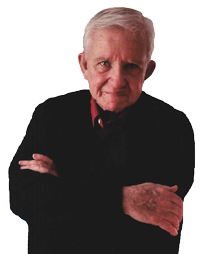
Sophie Faught plays saxophone with David Amram on piano.
Most of us who heard David Amram in concert at The Jazz Kitchen, and talking and playing more music on “Uncle Dan’s Story Hour” will not soon forget the good “vibrations” he left. Not only his music remains in my head, but also his talk, his humor, his open-ness and genuine encouragement to others to create, whatever their art, their passion.
David brought his percussionist, who happens to be his son Adam, whose bongo playing was an added delight, and Adam told us after the concert “Dad was really on fire” the nights he was here in Indianapolis. For all the distinguished work he has done, from playing with jazz masters like Charlie Mingus and Dizzy Gillespie, composing a flute concerto for Sir James Galway, writing music for movies like the first “Manchurian Candidate and “Splendor in the Grass,” creating music for performances of Joe Papp’s Shakespeare in the Park in New York, and plays by Arthur Miller and Paddy Chaevsky, conducting The Philadelphia Symphony, he has never “sold out,” never put money or prestige or honors ahead of doing the work he was “called to do,” the work he knows in his heart is his duty to create and perform.

L-R: Drummer Kenny Phelps, Producer Pat Chastain, Roadie Adele Chastain, Bass player Nick Tucker, Saxophonist Sophie Faught, Roadie John Chastain, Uncle Dan Wakefield, Percussionist Adam Amram, Star All-round Jazzman Extraordinaire David Amram, at Tim Brickley’s Rehearsal Studio.
You can get a number of his great CDs on the internet, and if you want to keep his vibrations in your head and heart, I urge you to read his first book – Vibrations: The Adventures and Musical Times of David Amram. He writes like he plays – all out, from the heart, and he has you hanging on his every cliff of creation to see at the last minute that the concerto will be put on, the poetry reading with Kerouac will find an audience, the opera for television will go on the air in spite of all network obstacles; Amram and his music will prevail. An early mentor told him “It’s going to be a long, long road… It’s never going to be easy.” That only spurred him on.
I have known Amram since I heard him play at the Five Spot in the Bowery in 1957, the hip jazz mecca of the era. His jazz group played for the publication party thrown by GQ magazine for my memoir New York in the Fifties and he talked and played on the documentary film of the same name. He came to play and talk to my class on “New York in the Fifties” at Florida International University, which was always the highlight of the year. My all-time favorite Amram concert was the one he gave for the fourth grade class of my God Daughter, Karina Corrales, at Kensington Park Elementary School in Miami. He arrived like Santa Claus, carrying a large pack on his back. In the pack were more than 25 native instruments from folk cultures all over the world, and he picked ones to play and talk about to Karina and her class.
He used the work of American authors whose work he loved – like John Dos Passos, John Steinbeck and Jack Kerouac – to serve as text for the music he composed for “A Year in Our Land,” a cantata that premiered at Town Hall in Manhattan. It was his “Thank you to the America I had dreamed of in my heart and mind and soul” and he wrote in Vibrations that as he listened to the music “”I didn’t even know if an America like the one described by these authors could ever exist anymore… And I felt a great sadness when I thought of how all this had been forgotten and ignored. I hoped the cantata might remind us of who we were.”
David still keeps reminding us of who we were at our best and who we still can be, and at 86 he isn’t slowing down, any more than the writer Gay Talese is slowing down at 85. Amram writes about the vibrations he felt when he was playing at a literary party and a beautiful woman asked him to dance: “We began dancing and that old feeling came over me. I thought I was being electrocuted.”
Get his Vibrations. You too can be turned on.
